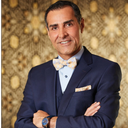Posted underFacelift q&a
face doctorFeb 2, 2015
Answers (14)
From board-certified doctors and trusted medical professionals
Dr. Elliot M. Heller, MD

EM
Dr. Elliot M. Heller, MD
Board Certified Facial Plastic Surgeon
Answer
Dr. Vincent N. Zubowicz, MD

VM
Dr. Vincent N. Zubowicz, MD
Board Certified Plastic Surgeon
Answer
Dr. Boris M. Ackerman, MD

BM
Dr. Boris M. Ackerman, MD
Board Certified Plastic Surgeon
Answer
Dr. Thomas Trevisani, MD

TM
Dr. Thomas Trevisani, MD
Board Certified Plastic Surgeon
Answer
Dr. William R. Burden, MD, FACS

WF
Dr. William R. Burden, MD, FACS
Board Certified Plastic Surgeon
Answer
Dr. Mark Hamilton, MD

MM
Dr. Mark Hamilton, MD
Board Certified Facial Plastic Surgeon
Answer
Dr. Tom J. Pousti, MD
TM
Dr. Tom J. Pousti, MD
Board Certified Plastic Surgeon
Answer
Dr. George T. Boris, MD, FRCS
GF
Dr. George T. Boris, MD, FRCS
Board Certified Otolaryngologist
Answer
Dr. Dean P. Kane, MD, FACS
DF
Dr. Dean P. Kane, MD, FACS
Board Certified Plastic Surgeon
Answer
More Facelift Questions
See all Facelift Q&A
WE SEND PRETTY
EMAILS
What’s trending? Who’s turning heads? Which TikTok myths need busting? We’ve got you. No fluff, no gatekeeping—just real talk. Get our free, unfiltered newsletter.





